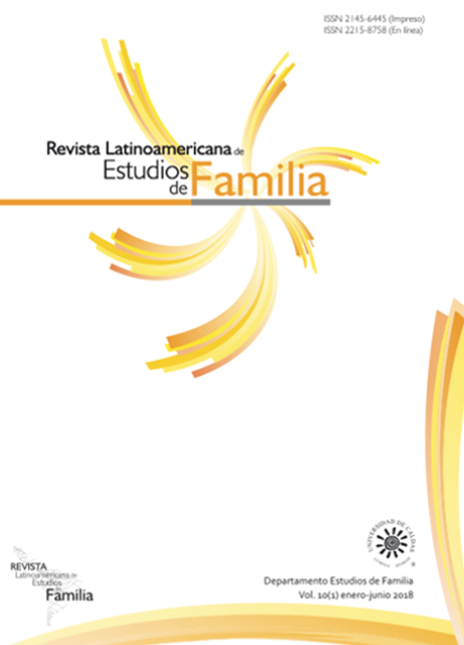Authors
Abstract
Objective. The coverage of pension plans in Latin America is relatively low and so, people postpone retirement and decide to continue working. The aim of the paper is to analyze the family characteristics that predict the decisions of leaving the job market with or without pension benefits. Methodology. Data from CRELES, a longitudinal survey of the elderly with two cohorts were used. Results and conclusions. Among people aged 55 and older who were working at the baseline, 25% left the labor market, and 9% started receiving retirement money, even though some of them continued working. People who make informal cash transfers to family members are more likely to retire, especially earlier than others. Those who looked after children were more likely to stop working without a formal pension. There was no evidence that the spouse’s working status was related to retirement decisions.
Keywords:
References
Bertranou, F.M. (2005). Restricciones, problemas y dilemas de la protección social en América Latina: enfrentando los desafíos del envejecimiento y la seguridad de los ingresos. Bienestar y Política Social, 1 (1), 35-58.
Bertranou, F.M., Calvo, E. & Bertranou, E. (2009). Is Latin American retreating from individual retirement accounts? Chestnut Hill, MA: Center for Retirement Research at Boston College.
Brenes, G. (2009). The pace of convergence of population aging in Latin America: opportunities and challenges. En S. Cavenaghi. (Ed.), Demographic transformations and inequalities in Latin America (pp. 137-153). Río de Janeiro, Brazil: ALAP.
Brenes, G. (2013). Factores socioeconómicos asociados a la percepción de situación socioeconómica entre adultos mayores de dos países latinoamericanos. Revista de Ciencias Económicas, 31(1), 153-167.
CCSS.(2017). Reglamento del Seguro de Invalidez, Vejez y Muerte. San José, Costa Rica: Caja Costarricense del Seguro Social.
Coile, C., Diamond, P., Gruber, J. & Jousten, A. (2002). Delays in claiming social security benefits. Journal of Public Economics, 84 (3), 357-385.
Dentinger, E. & Clarkberg, M. (2002). Informal caregiving and retirement timing among men and women gender and caregiving relationships in late midlife. Journal of Family Issues, 23 (7), 857-879.
Drobnic, S.(2002). Retirement timing in Germany:The impact of household characteristics. International Journal of Sociology, 32 (2), 75-102.
Fan, E. (2010). Who benefits from public old age pensions? Evidence from a targeted program. Economic Development and Cultural Change, 58 (2), 297-322.
Folstein, M.E. & Folstein, S.E. (1975). Mini-Mental State. A practical method for grading the cognitive state of patients for the clinician. Journal of Psychiatric Research, 12, 189–195.
Giles, J., Wang, D. & Zhao, C. (2010). Can China’s rural elderly count on support from adult children? Implications of rural-to-urban migration. Journal of Population Ageing, 3 (3-4), 183-204.
Giménez, D.M. (2005). Gender, pensions and social citizenship in Latin America. Santiago de Chile, Chile: United Nations Publication.
Gómez, M. & Miret, P. (2014). Working after age 50 in Spain. Is the trend towards early retirement reversing? Vienna Yearbook of Population Research, 12, 115-140.
Gustman, A.L. & Steinmeier, T.L. (2004). Social security, pensions and retirement behaviour within the family. Journal of Applied Econometrics, 19 (6), 723-737.
Hokema, A. & Scherger, S. (2016). Working pensioners in Germany and the UK: quantitative and qualitative evidence on gender, marital status, and the reasons for working. Journal of Population Ageing, 9 (1-2), 91-111.
Hsieh, H.L. (2008). Do Adult Children Matter? The Effects of National Health Insurance on Retirement Behavior: Evidence from Taiwan. Contemporary Economic Policy, 26 (2), 317-334.
Kim, S. & Feldman, D.C. (2000). Working in retirement: The antecedents of bridge employment and its consequences for quality of life in retirement. Academy of Management Journal, 43 (6), 1195-1210.
Lynch, J. (2006). Age in the welfare state: The origins of social spending on pensioners, workers, and children. Cambridge, UK: Cambridge University Press.
Manacorda, M. & Moretti, E. (2006). Why do most Italian youths live with their parents? Intergenerational transfers and household structure. Journal of the European Economic Association, 4 (4), 800-829.
Martinez, J. (2015). Chapter 7 Costa Rica. En F. Rofman., I. Apella. & E. Vezza. (Eds.), Beyond Contributory Pensions. Fourteen Experiences with Coverage Expansion in Latin America (pp. 185-210). Washington, D.C: International Bank for Reconstruction and Development/The World Bank.
Mastrogiacomo, M., Alessie, R. & Lindeboom, M. (2004). Retirement behaviour of Dutch elderly households. Journal of Applied Econometrics, 19 (6), 777-793.
Mesa, C. (2009). Social insurance (pensions and health), labour markets and coverage in Latin America. En K. Hujo. & S. McClanahan. (Eds.), Financing Social Policy. Mobilizing Resources for Social Development (pp. 215-245). New York: Palgrave Macmillan UK.
Mesa, C. (2012). The performance of social security contributory and tax‐financed pensions in Central America, and the effects of the global crisis. International Social Security Review, 651, 1-27.
Murrugarra, E. (2011). Employability and productivity among older workers: A policy framework and evidence from Latin America. Washington, D.C.: The World Bank: Social Protection and Labor.
O’Rand, A.M. & Farkas, J.I. (2002). Couples’ retirement timing in the United States in the 1990s: The impact of market and family role demands on joint work exits. International Journal of Sociology, 32 (2), 11-29.
Ogg, J. & Renaut, S. (2007). The influence of living arrangements, marital patterns and family configuration on employment rates among the 1945–1954 birth cohort: evidence from ten European countries. European Journal of Ageing, 4 (3), 155-169.
Olivera, J. & Zuluaga, B. (2014). The ex‐ante effects of non‐contributory pensions in Colombia and Perú. Journal of International Development, 26 (7), 949-973.
Pang, L., De Brauw, A. & Rozelle, S. (2004). Working until you drop: The elderly of rural China. The China Journal, 52, 73-94.
Pienta, A.M. & Hayward, M.D. (2002). Who expects to continue working after age 62? The retirement plans of couples. The Journals of Gerontology Series B: Psychological Sciences and Social Sciences, 57 (4), S199-S208.
Price, W., Ashcroft, J. & Inglis, E. (2016). Outcomes and Risk Based Supervision in Pensions. Washington, D.C.: The World Bank.
Quiroga, P., Albala, C. y Klaasen, G. (2004). Validación de un test de tamizaje para el diagnóstico de demencia asociada a edad en Chile. Revista Médica de Chile, 132 (4), 467-478.
Rentería, E., Turra, C.M. & Queiroz, B.L. (2007). Grandparents and grandchildren living together, a better life for the youngest? The cases of Brazil and Peru. Papeles de Población, 13 (52), 47-75.
Rosero, L. & Jiménez, P. (2012). Retos y oportunidades del cambio demográfico para la política fiscal de Costa Rica.San José, Costa Rica: Editorial Universidad de Costa Rica.
Rosero, L. & Zúñiga, P. (2010). Transferencias intergeneracionales en Costa Rica. Notas de Población, 37 (90), 111-132.
Saad, P.M. (2005). Los adultos mayores en América Latina y el Caribe: Arreglos residenciales y transferencias informales. Notas de población, 32 (80), 127-154.
Szinovacz, M.E. & Davey, A. (2005). Retirement and marital decision making: Effects on retirement satisfaction. Journal of Marriage and Family, 67 (2), 387-398.
Szinovacz, M.E., DeViney, S. & Davey, A. (2001). Influences of family obligations and relationships on retirement variations by gender, race, and marital status. The Journals of Gerontology Series B: Psychological Sciences and Social Sciences, 56 (1), 20-27.
Szinovacz, M.E. & DeViney, S. (2000). Marital characteristics and retirement decisions. Research on aging, 22 (5), 470-498.
Tablas, V.A. (2014). Encuesta Longitudinal de Protección Social 2013. Resumen del informe final. San Salvador, El Salvador: Gobierno de El Salvador, Sistema de Protección Social Universal, Banco Interamericano de Desarrollo.
Wong, R. & DeGraff, D.S. (2009). Old-age wealth in Mexico: the role of reproductive, human capital, and employment decisions. Research on aging, 31 (4), 413-439.

 PDF (Español)
PDF (Español)
 FLIP
FLIP
 Perfil Google Scholar
Perfil Google Scholar
























